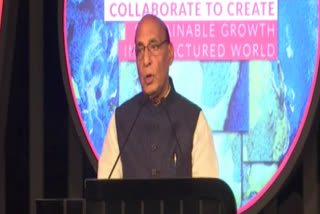New Delhi:The government has set a target of USD 26 billion turnover in aerospace and military manufacturing in next five years, Defence Minister Rajnath Singh said on Saturday, noting that indigenous defence production was key to achieving the country's aim to be a USD 5 trillion economy by 2024.
He said adequate thrust is being given on enhancing defence exports though the primary aim of indigenous defence production is to cater to the needs of the armed forces.
In an address at the ET Global Business Summit, urged the private sector to increase its participation in defence manufacturing to realise the government's vision of making India a USD 5 trillion economy by 2024.
Last year, Prime Minister Narendra Modi set an ambitious target of making India's economy a USD 5 trillion one by 2024. The current size of the Indian economy is around USD 2.8 trillion.
In his address, Singh said the manufacturing sector has the potential to reach USD 1 trillion by 2025 and that the government is striving to achieve the goal by implementing key flagship programmes like 'Make in India'.
"In our envisaged Defence Production Policy, we have clearly spelt out our goal to achieve a turnover of USD 26 billion in aerospace and defence goods and services by 2025. This will have huge implications for India's endeavours to promote R&D, innovation and its efforts to secure a place in global supply chains," he said.
Asking the defence industry to make best use of the opportunities, he said a slew of structural reforms has been initiated by the government to ensure synergy among key stakeholders.
Singh said the government accorded approval to more than 200 proposals worth Rs 4 lakh crore in defence manufacturing in the last five years.
He also said the government's aim is to double the size of aeronautics industry from Rs 30,000 crore to Rs 60,000 crore by 2024.
He said a number of major platforms are envisaged in defence aerospace sector including India's 90-seater civil aircraft, developing civil helicopter industry of USD 5 billion in public-private-partnership model.
He listed out several reform measures including simplification of the industrial licensing process, hike in FDI cap, making defence export less stringent, streamlining the defence offset policy and opening the government-owned trial and testing facilities for the private sector.
Singh said defence public sector undertakings have been encouraged to increase their export portfolio to 25 per cent of their turnover and the government is willing to extend Lines of Credit and grants to friendly foreign countries over the next five years.
